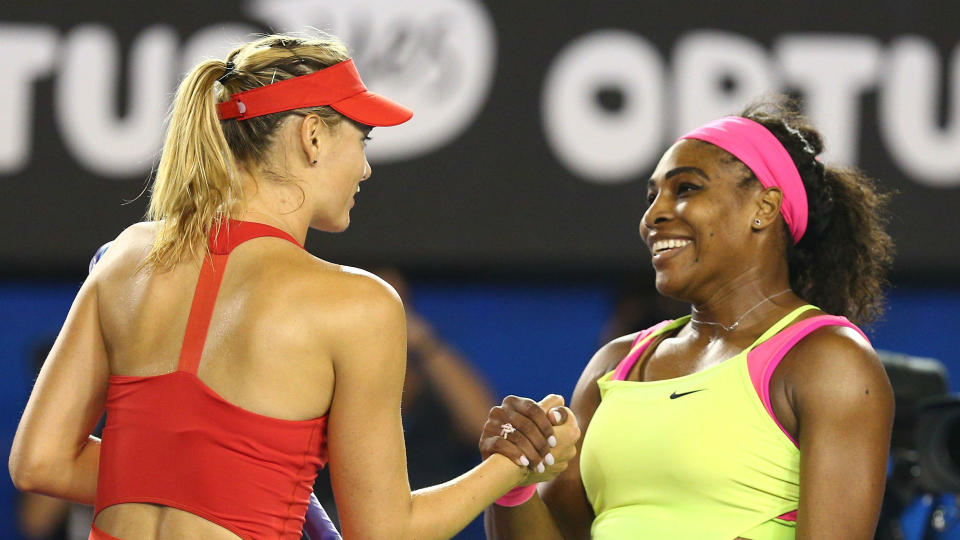Maria Sharapova on Serena Williams: 'We are not friends, not at all'

Like Patrick Ewing, Phil Mickelson, and anyone who’s ever had the misfortune to share a pool with Michael Phelps, Maria Sharapova has been a champion who’s lived under the shadow of an icon. For Sharapova, winner of five majors, the great unapproachable has always been Serena Williams, whose 18-year run of 23 majors has both eclipsed and enveloped Sharapova’s career.
Now, Sharapova is telling her story in “Unstoppable: My Life So Far,” released Tuesday, and as expected, Williams looms large over Sharapova’s tale. Indeed, Williams shows up on the second page of the prologue: “Serena Williams has marked the heights and limits of my career,” Sharapova writes. “Our stories are intertwined. I approach every match against her with trepidation and respect … I’ve beaten all the players who have beaten Serena, but it’s been nearly impossible for me to beat Serena herself.”
Indeed, although this is Sharapova’s autobiography, Williams deserves at least supporting-actress status; her name shows up 106 different times in the course of the book. Williams is five years older than Sharapova, but even as a child, Sharapova started working Serena-inspired mind games, with herself if not yet with Williams. Given the opportunity to watch Serena and sister Venus early in their career, Sharapova declined: “I will not watch them,” she thought. “I’m not going to let them see me at their practice. I don’t care if there are a hundred people watching and they have no idea who I am. I will never give them that satisfaction.”
Sharapova did end up watching the sisters, through a small hole in a wall usually used for cameras to film players. “Just me alone,” she writes, “in the dark, seeing the next twenty years of my life.”
For years, Sharapova watched Williams from afar, always vowing to beat her. And then, in 2004, she got her chance at the Miami Open, facing off against Williams as an unknown 17-year-old. “Her physical presence is much stronger and bigger than you realize watching TV,” Sharapova writes. “She has thick arms and thick legs and is so intimidating and strong. And tall, really tall. I looked across the net, and, no way to get around it, she was just there!” Williams won that match, but Sharapova came away thinking that she might just have a chance against the icon. (Spoiler: she didn’t. Sharapova hasn’t beaten Williams since 2004.)
Sharapova makes sure to get in a few jabs about Serena, noting that “there’s a lot of drama in her game,” by, for instance, fake-stumbling while chasing a ball—”her way of telling the world, ‘Oh, I could have gotten that if the grass wasn’t so [messed] up.'” Sharapova presses the point later in her description of an epic Wimbledon match against Williams: “She does not miss the shot because she’s fallen down; she falls down because she’s going to miss the shot.” (To be fair, when Sharapova won that Wimbledon title, Williams embraced her at the net.)
But the key point in Sharapova’s relationship with Williams came moments after that final, when Sharapova walked into the locker room and heard Williams bawling, loudly and openly. Over the course of their careers, Williams has beaten Sharapova 19 of the 21 times they’ve met, and Sharapova traces it back to that one Wimbledon moment: “I think she hated me for taking something that she believed belonged to her,” she writes. “I think she hated me for seeing her at her lowest moment. But mostlyI think she hated me for hearing her cry. She’s never forgiven me for it. Not long after the tournament, I heard that Serena told a friend, who then told me, ‘I will never lose to that little [rhymes-with-witch] again.”
Sharapova had planned to retire by this point in her career, but was flagged early in 2016 for the use of meldonium, a banned substance, and was bounced from the tennis world for 15 months. (Sharapova attempts to explain the rationale as both innocent mistake and bureaucratic overreach, compounded by the fact that she didn’t read emails notifying her of meldonium’s designation as banned.) She returned to grand slam play for the first time since her suspension at the U.S. Open earlier this month, reaching the fourth round. Williams wasn’t playing, having taken time off to give birth to her first child.
Sharapova gets philosophical about her relationship with Williams, and doesn’t hold back: “Serena and I should be friends: we love the same thing, we have the same passion,” she writes. “But we are not friends—not at all. I think, to some extent, we have driven each other. Maybe that’s better than being friends. Maybe that’s what it takes to fire up the proper fury … Someday, when all this is in our past, maybe we’ll become friends. Or not.”
____
Jay Busbee is a writer for Yahoo Sports and the author of EARNHARDT NATION, on sale now at Amazon or wherever books are sold. Contact him at jay.busbee@yahoo.com or find him on Twitter or on Facebook.
More from Yahoo Sports:
• Why the two teams that need Kaepernick won’t sign him
• Japanese baseball star to forgo millions to play in U.S.
• Failed drug test could actually be good news for UFC star
• Why it’s time to really worry about Adrian Peterson


